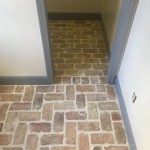How to Lay Flooring Over Tile: A Comprehensive Guide
Transforming a tiled floor into a more stylish and functional surface can be a practical and cost-effective solution. Laying flooring over tile is a feasible project for both DIY enthusiasts and professional renovators. However, proper preparation and careful execution are crucial to ensure a successful outcome. Here's a comprehensive guide to help you navigate the process seamlessly:
Step 1: Assessing the Tile Surface
Evaluating the existing tile is essential. Ensure that the tiles are securely bonded to the subfloor without any loose or cracked tiles. Remove any tiles that may hinder the installation or compromise the stability of the new flooring. Clean the surface thoroughly to remove dirt, debris, or any adhesive residue.
Step 2: Leveling and Smoothing the Surface
Uneven tiles can create bumps and dips in the new flooring. Use a self-leveling compound to fill in any gaps or depressions. Spread the compound evenly and allow it to dry completely. This step ensures a smooth and flat surface for the new flooring to adhere properly.
Step 3: Choosing the Right Underlayment
An underlayment provides additional cushioning, moisture protection, and soundproofing. Select an underlayment suitable for the type of flooring you intend to install. For example, use a cushioned underlayment for laminate flooring or a waterproof underlayment for vinyl flooring.
Step 4: Installing the New Flooring
Follow the manufacturer's instructions for installing the new flooring. Most floating floors, such as laminate or vinyl planks, can be installed directly over the underlayment. For glued-down flooring, like hardwood or tile, apply adhesive according to the manufacturer's recommendations.
Step 5: Finishing Touches
Once the flooring is installed, trim any excess underlayment or flooring around the edges. Install moldings or baseboards to cover the expansion gap and provide a finished look. Clean up any debris or adhesive residue to complete the project.
Essential Considerations
- Type of Flooring: Choose a flooring material compatible with the existing tile surface. Consider factors like durability, moisture resistance, and maintenance requirements.
- Adhesion: Ensure that the new flooring adheres properly to the tile. Use a suitable adhesive or underlayment that provides a strong bond.
- Expansion Gaps: Allow for expansion and contraction of the new flooring by leaving a small gap around the edges. Cover the gap with moldings or baseboards.
- Moisture Protection: If installing flooring in areas prone to moisture, use a waterproof underlayment or flooring material to prevent water damage.
- Professional Assistance: For complex installations, such as hardwood flooring or intricate tile patterns, consider consulting a professional flooring installer.
Conclusion
Laying flooring over tile is a practical and cost-effective way to update the look and functionality of your home. By following these steps carefully and taking into account the essential considerations, you can achieve a professional-looking and durable flooring installation. Remember to assess the existing tile, prepare the surface, choose the right materials, and execute the installation with precision. With proper planning and attention to detail, you can transform your tiled floor into a beautiful and functional space.

Should You Install Vinyl Floor Over Tile

What Type Of Flooring Can You Install Over Ceramic Tile

Can You Put Laminate Flooring Over Tile Twenty Oak

Install Laminate Flooring Over Ceramic Tile

Installing Laminate Tile Over Ceramic Diy Floors Wonderhowto

Installing Laminate Tile Over Ceramic Diy Floors Wonderhowto

Can You Put Laminate Or Vinyl Plank Flooring Over Tile
Ideas For Covering Up Tile Floors Without Removing It The Decor Formula

Vinyl Tile Installation A Comprehensive Guide Gc Flooring Pros

Installing Laminate Tile Over Ceramic Diy Floors Wonderhowto
See Also







